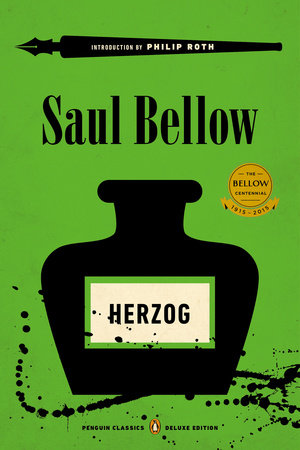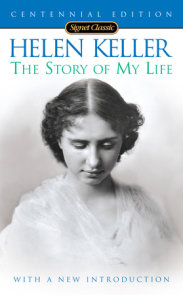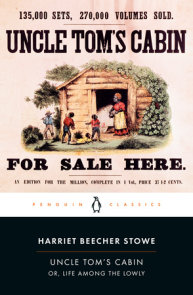READERS GUIDE
Questions and Topics for Discussion
INTRODUCTION
Winner of the National Book Award when it was first published in 1964, Herzog traces five days in the life of a failed academic whose wife has recently left him for his best friend. Through the device of letter writing, Herzog movingly portrays both the internal life of its eponymous hero and the complexity of modern consciousness.
Like the protagonists of most of Bellow’s novels—Dangling Man, The Victim, Seize the Day, Henderson the Rain King, etc.—Herzog is a man seeking balance, trying to regain a foothold on his life. Thrown out of his ex-wife’s house, he retreats to his abandoned home in Ludeyville, a remote village in the Berkshire mountains to which Herzog had previously moved his wife and friends. Here amid the dust and vermin of the disused house, Herzog begins scribbling letters to family, friends, lovers, colleagues, enemies, dead philosophers, ex- Presidents, to anyone with whom he feels compelled to set the record straight. The letters, we learn, are never sent. They are a means to cure himself of the immense psychic strain of his failed second marriage, a method by which he can recognize truths that will free him to love others and to learn to abide with the knowledge of death. In order to do so he must confront the fact that he has been a bad husband, a loving but poor father, an ungrateful child, a distant brother, an egoist to friends, and an apathetic citizen.
As Herzog obsessively reviews the evidence of Madeleine’s and Gersbach’s affair, we piece together the circumstances of Herzog’s recent past: how Madeleine ached to leave their Emersonian life in the Berkshires, how she grew fond of the flamboyant and masculine Valentine Gersbach, how, after their marriage dissolved in Chicago, Herzog took his melancholy to Europe, and how he returned to interrogate each and every one of their friends about Madeleine’s adultery. These recollections impugn not only Madeleine and Gersbach, but, more significantly, they impugn Herzog for overvaluing his own suffering. At one lucid point, he borrows a line from Shelley to express the relative meaninglessness of his suffering: “I fall upon the thorns of life, I bleed. And then? I fall upon the thorns of life, I bleed. And what next?” His sense of injury may be great but what of the pain felt by people like his childhood friend Nachman whose wife has lapsed into insanity? What of the pain of Madeleine’s mother Tennie who is left by her playboy ex-husband and her inattentive daughter to age alone? Herzog also asks what the suffering of a cuckolded man is worth in relation to the collective sufferings of societies living in the shadow of Hiroshima and the Holocaust? As a former scholar of Romanticism, Herzog is compelled to weigh serious questions of culture and civilization. Thinking of the world wars, perhaps too of America’s involvement in Vietnam and its battles over racism, Herzog wryly revises De Tocqueville’s prediction that modern democracies would produce less crime but more private vice to “less private crime, more collective crime.” The betrayal he has experienced at the hands of friends and lovers is mirrored by the betrayal he feels at the hands of modern American society where “people are dying…for lack of something real to carry home when day is done.” While the garbled, fragmentary letters often display the clashing of personal and public crises; for Herzog the project to restore oneself and the project to restore civilization are really one. It is a Romantic idea that finds eloquent expression in Blake whose work is repeatedly invoked by Herzog.
Crucial to the restoration of American culture, Herzog believes, is a condemnation of the “wasteland outlook.” Referring to an intellectual tradition based on the bleak diagnoses of modern civilization by Nietzsche, T. S. Eliot, Spengler, Heidegger and other existentialist philosophers, Herzog laments the wasteland outlook as “the full crisis of dissolution…the filthy moment…when moral feeling dies, conscience disintegrates, and respect for liberty, law, public decency, all the rest, collapses in cowardice, decadence, blood.” Real transcendence, according to the wasteland outlook, is only possible in the immoral, “gratuitous” act. In opposition to this philosophy, Herzog offers the wisdom of Blake: “Man liveth not by self alone but in his brother’s face…Each shall behold the Eternal Father and love and joy abound.” Bellow dramatizes, with comedic effect, these ideas in the “murder” scene. Pistol wielding Herzog realizes, as he peers through Madeleine’s bathroom window and sees his wife’s lover bathing his own daughter, that the taking or the saving of life has meaning. He resists the temptations of immoralism, and through this act of moral will Herzog manages to regain his balance. That Herzog transcends his personal hurt while being charged at the police station is both ironic and deeply affecting. Now with a “tranquil fullness of heart” he can compose letters of a different character. He reaches out in love to join the human race, writing to his dead mother, to congratulate a colleague on a recent book, to Nietzsche to resolve his mixture of admiration and distrust, to God to affirm his will to live, and to himself in which he rises to a state of rapture: “Something produces intensity, a holy feeling, as oranges produce orange, as grass green.” In the end, with “not a single word” left to say, Herzog is restored to himself.
Herzog is primarily a novel of redemption. For all of its innovative techniques and brilliant comedy, it tells one of the oldest of stories. Like the Divine Comedy or the dark night of the soul of St. John of the Cross, it progresses from darkness to light, from ignorance to enlightenment. Today it is still considered one of the greatest literary expressions of postwar America.
ABOUT SAUL BELLOW
Praised for his vision, his ear for detail, his humor, and the masterful artistry of his prose, Saul Bellow was born of Russian Jewish parents in Lachine, Quebec in 1915, and was raised in Chicago. He received his Bachelor’s degree from Northwestern University in 1937, with honors in sociology and anthropology, and did graduate work at the University of Wisconsin. During the Second World War he served in the Merchant Marines.
His first two novels, Dangling Man (1944) and The Victim (1947) are penetrating, Kafka-like psychological studies. In 1948 he was awarded a Guggenheim Fellowship and spent two years in Paris and traveling in Europe, where he began his picaresque novel The Adventures of Augie March. Augie March went on to win the National Book Award for fiction in 1954. His later books of fiction include Seize the Day (1956); Henderson the Rain King (1959); Mosby’s Memoirs and Other Stories (1968); Mr. Sammler’s Planet (1970), which won the National Book Award; Humboldt’s Gift (1975), which won the Pulitzer Prize; The Dean’s December (1982); More Die of Heartbreak (1987); Theft (1988); The Bellarosa Connection (1989);The Actual (1996); and, most recently, Ravelstein (2000). Bellow has also produced a prolific amount of non-fiction, collected in To Jerusalem and Back, a personal and literary record of his sojourn in Israel during several months in 1975, and It All Adds Up, a collection of memoirs and essays.
Bellow’s many awards include the International Literary Prize for Herzog, in which he became the first American to receive the prize; the Croix de Chevalier des Arts et Lettres, the highest literary distinction awarded by France to non-citizens; the B’nai B’rith Jewish Heritage Award for “excellence in Jewish Literature”; and America’s Democratic Legacy Award of the Anti-Defamation League of B’nai B’rith, the first time this award has been made to a literary personage. In 1976 Bellow was awarded the Nobel Prize for Literature “for the human understanding and subtle analysis of contemporary culture that are combined in his work.”
DISCUSSION QUESTIONS




















